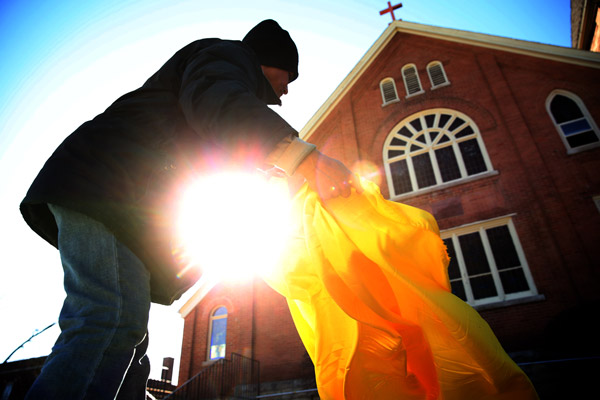
Scott Strazzante/Chicago Tribune
One of my friends asked me yesterday why a Protestant would have any interest in the papacy. My answer was twofold:
1) The pageantry. If your impression of rural evangelical protestantism is quaint old wooden churches in the holler, you're about a century too late (we had one of those on my road, but someone turned it into a house). Odds are good that it had vinyl siding; I once went to church in a double-wide. It's unpretentiously democratic but it's hard to find something like majesty.
2) The theological and political intrigue. Evangelical protestants who determine the public face of the church tend to be those who start cable channels. Again, democratically unpretentious, but not as interesting as the hierarchical winnowing of theological principles.
So I've been curious to see how Jesuits are reacting to Pope Francis. "What's So Weird About a Jesuit Pope?" in The Jesuit Post, by Saint Louis University MA student Matt Spotts, is a good start as to why there's never been a Jesuit pope despite the Society's size, but why it's possible anyway.
While the rule says that Jesuits aren’t to become bishops, Ignatius knew that some rules may need to be broken. He was a big fan of the phrase “but if the situation warrants…” At times a pope commands that a Jesuit lay aside his life under the Jesuit rule and take up an entirely different role as a bishop. And yesterday, for the first time in our history a conclave told a Jesuit bishop to take up the office of Bishop of Rome. A honest and faithful Jesuit must strive to balance the the requirement not to seek honors and the Jesuit obligation to obediently serve the mission of the Church.
Also good from TJP is "Habemus Curriculum Vitae": "today, the world met a pope who could not possibly have dressed any more simply."
Getting further into the theological significance of Jorge Bergoglio's ascension to the papacy are James M. Weiss (a South Side native and Ignatius alum like my wife and now a Boston U. prof) and Michael Garanzini, president of Loyola University Chicago. Their takes on Pope Francis are a bit different, and between the two you can start to place him and what his election means to the Church.
More important, he embodies — and amazingly, he reconciles! — so many diverse elements of current Catholic reality. He is as close to "the complete papal package" as one could imagine. He combines his Argnetine nationality; his immigrant parents' poor working-class Italian background; his sophisticated theological study in Germany; his identity in the Jesuits as the largest, most influential order of the church; and his affiliation with Communion and Liberation, a growing (and slightly controversial) worldwide movement to empower laypeople to live out their secular callings by Catholic values.
Reading between the lines: South American Jesuits have a reputation for being kind of liberal, in particular on economic issues. Which Bergoglio is, but not dramatically so:
Bergoglio has supported the social justice ethos of Latin American Catholicism, including a robust defense of the poor.
"We live in the most unequal part of the world, which has grown the most yet reduced misery the least," Bergoglio said during a gathering of Latin American bishops in 2007. "The unjust distribution of goods persists, creating a situation of social sin that cries out to Heaven and limits the possibilities of a fuller life for so many of our brothers."
At the same time, he has generally tended to accent growth in personal holiness over efforts for structural reform.
Compare that to Peter Turkson, who called for global economic regulation in 2011. Then there's the "affiliation with Communion and Liberation," "a Catholic movement born in Italy and seen as a bulwark of conservative Catholic opinion."
Which is why Garanzini describes Pope Francis as something of a compromise pope:
But, I suspect, his fellow cardinals turned to Cardinal Bergoglio because he can make difficult decisions and his theology is conservative, in the style of his predecessors John Paul II and Benedict XVI. However, he also represents the New World, where Christianity and Catholicism are still vital, critical players in the debates over social equality and fairness.
So he's a conservative liberal, a South American with familial and theological ties to Italy. As to more broadly theological concerns, John Kass asks if Pope Francis can challenge 21st century secularism: "Is it our ravenous consumerism? Our hunger requiring shiny new objects and ever-stronger sensations?" Michael Miner points out that the challenge is much greater than that.


